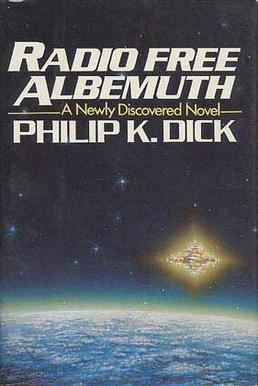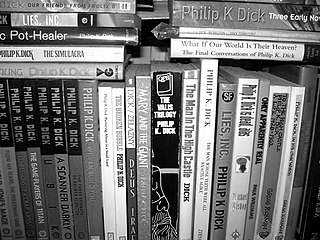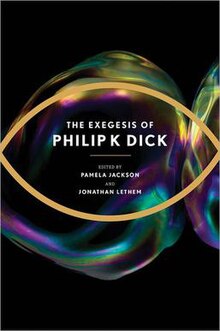Background to the journals
Dick started the journal after his visionary experiences in February and March 1974, which he called "2-3-74." These visions began shortly after Dick had two impacted wisdom teeth removed. When a delivery person from the pharmacy brought his pain medication, he noticed the ichthys necklace she wore and asked her what it meant. She responded that it was a symbol used by the early Christians, and in that moment Dick's religious experiences began:
In that instant, as I stared at the gleaming fish sign and heard her words, I suddenly experienced what I later learned is called anamnesis —a Greek word meaning, literally, "loss of forgetfulness." I remembered who I was and where I was. In an instant, in the twinkling of an eye, it all came back to me. And not only could I remember it but I could see it. The girl was a secret Christian and so was I. We lived in fear of detection by the Romans. We had to communicate with cryptic signs. She had just told me all this, and it was true.
For a short time, as hard as this is to believe or explain, I saw fading into view the black, prisonlike contours of hateful Rome. But, of much more importance, I remembered Jesus, who had just recently been with us, and had gone temporarily away, and would very soon return. My emotion was one of joy. We were secretly preparing to welcome Him back. It would not be long. And the Romans did not know. They thought He was dead, forever dead. That was our great secret, our joyous knowledge. Despite all appearances, Christ was going to return, and our delight and anticipation were boundless. [1]
In the following weeks, Dick experienced further visions, including a hallucinatory slideshow of abstract patterns and an information-rich beam of pink light. In the Exegesis, he theorized as to the origins and meaning of these experiences, frequently concluding that they were religious in nature. The being that originated the experiences is referred to by several names, including Zebra, God, and the Vast Active Living Intelligence System. From 1974 until his death in 1982, Dick wrote the Exegesis by hand in late-night writing sessions, sometimes composing as many as 150 pages in a sitting. In total, it consists of approximately 8,000 pages of notes, only a small portion of which have been published.
Besides the Exegesis, Dick described his visions and faith in numerous other works, including VALIS , Radio Free Albemuth , The Divine Invasion , The Transmigration of Timothy Archer , one brief passage in A Scanner Darkly , and the uncompleted The Owl in Daylight , as well as many essays and personal letters. In Pursuit of Valis: Selections from the Exegesis was published in 1991.

Philip Kindred Dick, often referred to by his initials PKD, was an American science fiction writer and novelist. He wrote 44 novels and about 121 short stories, most of which appeared in science fiction magazines during his lifetime. His fiction explored varied philosophical and social questions such as the nature of reality, perception, human nature, and identity, and commonly featured characters struggling against elements such as alternate realities, illusory environments, monopolistic corporations, drug abuse, authoritarian governments, and altered states of consciousness. He is considered one of the most important figures in 20th-century science fiction.

A Scanner Darkly is a science fiction novel by American writer Philip K. Dick, published in 1977. The semi-autobiographical story is set in a dystopian Orange County, California, in the then-future of June 1994, and includes an extensive portrayal of drug culture and drug use. The novel is one of Dick's best-known works and served as the basis for a 2006 film of the same name, directed by Richard Linklater.

Radio Free Albemuth is a dystopian novel by Philip K. Dick, written in 1976 and published posthumously in 1985. Originally titled VALISystem A, it was his first attempt to deal in fiction with his experiences of early 1974. When his publishers at Bantam requested extensive rewrites he canned the project and reworked it into the VALIS trilogy. Arbor House acquired the rights to Radio Free Albemuth in 1985. They then published an edition under the current title, prepared from the corrected typescript given by Dick to his friend Tim Powers.
"Faith of Our Fathers" is a science fiction short story by American writer Philip K. Dick, first published in the anthology Dangerous Visions (1967).

Valis is a 1981 science fiction novel by American writer Philip K. Dick, intended to be the first book of a three-part series. The title is an acronym for Vast Active Living Intelligence System, Dick's gnostic vision of God. Set in California during the 1970s, the book features heavy auto-biographical elements and draws inspiration from Dick's own investigations into his unexplained religious experiences over the previous decade.
The VALIS trilogy is a set of science fiction/philosophical novels by author Philip K. Dick which include VALIS (1978), The Divine Invasion (1980), and The Transmigration of Timothy Archer (1982). Dick's first novel about the VALIS concept originally titled "VALISystem A", was published as Radio Free Albemuth after Dick's death in 1985.

Theophany is an encounter with a deity that manifests in an observable and tangible form. It is often confused with other types of encounters with a deity, but these interactions are not considered theophanies unless the deity reveals itself in a visible form. Traditionally, the term "theophany" was used to refer to appearances of the gods in ancient Greek and Near Eastern religions. While the Iliad is the earliest source for descriptions of theophanies in classical antiquity, the first description appears in the Epic of Gilgamesh.

Jonathan Allen Lethem is an American novelist, essayist, and short story writer. His first novel, Gun, with Occasional Music, a genre work that mixed elements of science fiction and detective fiction, was published in 1994. In 1999, Lethem published Motherless Brooklyn, a National Book Critics Circle Award-winning novel that achieved mainstream success. In 2003, he published The Fortress of Solitude, which became a New York Times Best Seller. In 2005, he received a MacArthur Fellowship. Since 2011, he has taught creative writing at Pomona College.

The Divine Invasion is a 1981 science fantasy novel by American writer Philip K. Dick. It is the second book in the gnostic VALIS trilogy, and takes place in the indeterminate future, perhaps a century or more after VALIS. The novel, originally titled Valis Regained, was nominated to the BSFA Award.
The Owl in Daylight is a novel Philip K. Dick was writing at the time of his death in 1982. He had already been paid an advance for the book by the publisher and was working against a deadline. After his death, his estate approached other writers about the possibility of someone completing the novel based on his notes, but that proved to be impossible, as he had never formally outlined the story. Dick viewed the novel as his Finnegans Wake. The idea was inspired partly by an entry in the Encyclopædia Britannica on Beethoven that referred to him as the most creative genius of all time, partly by traditional views of what constitutes the human heaven, and finally by the Faust story.
Harcourt was an American publishing firm with a long history of publishing fiction and nonfiction for adults and children. The company was last based in San Diego, California, with editorial/sales/marketing/rights offices in New York City and Orlando, Florida, and was known at different stages in its history as Harcourt Brace, & Co. and Harcourt Brace Jovanovich. From 1919 to 1982, it was based in New York City.

Erik Davis is an American writer, scholar, journalist and public speaker whose writings have ranged from rock criticism to cultural analysis to creative explorations of esoteric mysticism. He is perhaps best known for his book Techgnosis: Myth, Magic and Mysticism in the Age of Information, as well as his work on California counterculture, including Burning Man, the human potential movement, and the writings of Philip K. Dick.
"A Little Something for Us Tempunauts" is a science fiction short story by American writer Philip K. Dick. It was first published in the anthology Final Stage in 1974.
"The Eye of the Sibyl" is a science fiction short story by American writer Philip K. Dick. It was written sometime around 1975, but not published until 1987 when it was included in volume 5 of The Collected Stories of Philip K. Dick, and has been reprinted since in other editions of this book such as the U.S. edition The Eye of the Sibyl and Other Stories.

The bibliography of Philip K. Dick includes 44 novels, 121 short stories, and 14 short story collections published by American science fiction author Philip K. Dick during his lifetime.

Gather Yourselves Together is an early novel by the science fiction author Philip K. Dick, written around 1948–1950, and published posthumously by WCS Books in 1994. As with many of his early books which were considered unsuitable for publication when they were first submitted as manuscripts, this was not science fiction, but rather a work of straight literary fiction. The manuscript was 481 pages in length. At the time it was published, it was one of only two Dick novels for which the manuscript was known to exist which remained unpublished. The other, Voices from the Street, was published in 2007.

Radio Free Albemuth is a 2010 American film adaptation of the dystopian novel Radio Free Albemuth by author Philip K. Dick, which was written in 1976 and published posthumously in 1985. The film is written, directed, and produced by John Alan Simon and stars Jonathan Scarfe and Shea Whigham.
Chris Moriarty is an American science fiction and fantasy writer.

Selected Stories of Philip K. Dick is a collection of science fiction stories by Philip K. Dick. It was first published by Random House in 2002. Many of the stories had originally appeared in the magazines Planet Stories, Fantasy and Science Fiction, Imagination, Space Science Fiction, Astounding, Beyond Fantasy Fiction, Orbit, Galaxy Science Fiction, Fantastic Universe, Amazing Stories, Rolling Stone College Papers, Omni and Playboy.












